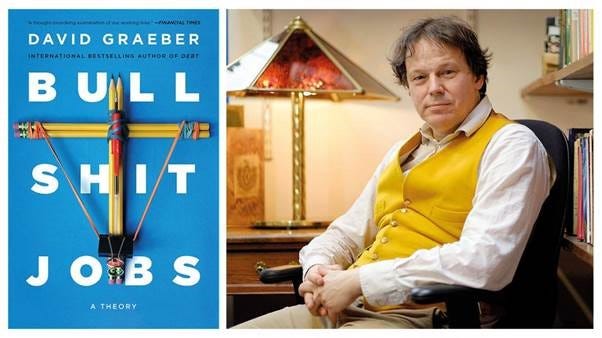The Obsolescence of Bullshit Jobs
What makes work meaningful nowadays and can we still find meaning in our lives if AI replaces us? And what happens when Gunthers Anders's alarmist thoughts meet David Graeber's cynical worldview?
Another day in the office, another meeting set up by another colleague who “forgot” to add an agenda. Hmmm...
So, unless you are planning an improv battle, or preparing the attendees to audition for “The Bla Bla Bla Show”, adding an agenda is fairly advisable, especially if the topic is as broad and undefined as AI.
And yes, this is another article about what sounds more like a buzzword than an actual subject for which, I don’t think many of us are prepared, or have much to say apart from repeating what has been seen on the BBC.
Since November 2022, (the official launch of ChatGPT), online searches related to “AI” and “ChatGPT” have skyrocketed, and something’s telling me it’s not going to stop.
The more people search for a specific topic, the more the topic is publicly adopted, however, one can also ask if there is a direct correlation between media coverage and its full understanding by the public.
According to the pioneers of the “Knowledge Gaps Theory”, Phillip J. Tichenor, George A. Donohue, and Clarice, when information about a particular topic is disseminated through mass media, gaps in knowledge between socioeconomic (SEC) groups tend to widen rather than narrow. Simply put, as rich people have greater access, and “supposedly” better cognitive ability to understand complex information, they are in a better position to make more effective use of mass media, and by extension make better decisions to adapt to any societal changes.
Although it does seem to make sense, I don’t fully buy it! People from a lower socioeconomic background might not have the luxury to distil and peruse the information from the New York Times, they will surely make the right decision based on their direct experience and circumstances. But anyway, I digress.
According to a McKinsey’s report, more than 800 million jobs will disappear and 12 million people will switch careers by 2030, provided they receive the relevant training. And unfortunately, this worldwide adoption of AI will mainly impact jobs owned by talent who have a less advantaged socioeconomic (SEC) background. Indeed data predicts that Order Pickers, Tax preparers, Cashiers, File clerks, Outbound sales agents, and Assembly technicians will become obsolete before the next decade which matches up with Google’s predictions
Without a shadow of a doubt, jobs that are at high risk of being replaced by AI have one thing in common; they involve repetitive and automated tasks that do not bring any real value for the employees and society, those jobs are something that the American Anthropologist, David Graeber might call “bullshit jobs” (BS).
One can define a BS job as being meaningless, unfulfilling, unnecessary, and rather draining to execute daily. For those who work in an office, you might think twice about the tasks you put on your to-do list and reevaluate the time you spend creating a complex colour-coded spreadsheet that no one uses, because yes, it can be classified as bulls@@@ task. Oops!
The author identifies 5 types of bullshit jobs: -
The Flunkies / The most delusional. Those jobs exist solely to make someone with a higher position, or a company look important. This will include personal assistants, door attendants, store greeters, and security men working in an empty and never-visited office.
Goon jobs / The most aggressive. Those jobs are the most complex to understand but they exist just because another entity (company, institution, or country) has it. A good example is the army, it only exists because other countries have it. This will involve roles like lobbyists, PR specialists, and corporate lawyers engaged in litigation.
Duct tapers / The most frustrating. Those jobs are individuals employed to fix problems that shouldn't exist in the first place. These roles generally exist in the IT or any tech departments due to poorly designed systems.
Box Tickers / The most hypocritical. Those jobs involve fulfilling bureaucratic requirements without producing any tangible value or structural changes due to the limitations imposed by the companies. Those jobs can provide “valuable” content for internal comms teams eager to shout on social media their fake news and commitment; and unfortunately, many equality, diversity, and inclusion (EDI) consultants have been trapped in this space.
Taskmasters / The most common in an office. Here the managers create in good faith useless tasks for their team and take great pleasure, annoyingly to check if they have been completed correctly. In the worst cases, Taskmasters end up creating more useless functions and departments. These individuals have this artistic sense of creating emptiness from nothing.
To remain profitable, companies are continually forced to jump on the fastest technology wagon to innovate, automate, and improve ROI. This pushes employees to become an auxiliary function that brings value, or in more cynical terms are classified to be important to the company thanks to their ability to maintain the adopted technology implemented in their company.
As a result, creating meaningful jobs that serve the essential needs of our society becomes inevitably a fragile and quivering “nice to have”.
In a previous article, my preferred pronouns are (common / sense), I explained the risks of the constant compartmentalisation of modern jobs, which precludes employees from seeing their contribution to a final product or service and alienate them from understanding why they are doing it. And let’s face it sucks.
But the proliferation of bullshit jobs has also determinantal impacts on employee engagement and their mental health. Now more than ever we are seeing an explosion of new psychological terms related to “work illness” such as ‘bore-out’, ‘fade-out’, and ‘brownout’. The latter is characterised by employees feeling overworked, demotivated, and disengaged – which is essentially the stage before burnout.
However, burnout is a state of complete mental, physical, and emotional exhaustion. And while it is widely accepted that the state of extinction of an employee is the result of unbearable work demands, this is only partly true. One of the contributing factors for someone to burnout is to be slapped by the harsh reality that their 9 to 5 job is as absurd, useless, and hopeless as the Danaids’ fate condemned to an eternity of torment in the underworld and forced to fill a leaky vessel with water.
Probably the first bullshit job of humanity!
So, is there such a thing as a dream job, and are jobs with true meaning at risk of becoming endangered? But before stressing out how do we know if our jobs have meaning?
This exercise unfortunately becomes tricker as we are increasingly led to believe by so-called experts in personal development via their immaculate Instagram posts meditating in a lotus position in front of the sea with the hashtag #findthepursposeinyourlife, that what is meaningful must lead to a permanent state of wellbeing free from any constraint.
Hmm, sounds like David Graeber forgot to add this to his list of bullshit jobs.
As the meaning of life and by extension our work has been debated and questioned by poets, authors, and philosophers since the dawn of humanity I won’t be able to answer it. Nevertheless, modern work Philosophers such as Julia de Funes have thought about it. So, let’s look at her theory.
To comprehend what is considered as meaningful, in other words, what gives a sense, we need to go source of the word “sense”. When you look it up in a dictionary, you can see 3 different definitions:
Sensation – Our touch, sight, hearing, smell, and taste
Direction – Where we go
Signification – The meaning of a word
Because those definitions are under the same word, they must have something in common. And the key to this enigma can only be found once we understand what they have in common. If you can find what it is, seriously well done.
I give a moment to think about it.
Ok, I’ll give you the answer, which was hard to find, but easy to understand. For any of those 3 definitions to make sense, no pun intended, an exteriority is needed.
For the sensation, we can’t access our senses unless we access something external. To access the sound of your voice you need to record it and have this cringe feeling of not recognising it. It’s the same thing with our sight - without a mirror, you can’t access the sight of you seeing something.
The concept of direction only makes sense when you are on your way, not when you have reached your destination.
The signification of a word is possible when the word refers to something external (abstract or material). For example, the word “laptop” makes sense only because it refers to something external – the laptop itself.
Need an aspirin?
So, if what makes sense is always external to the thing itself, then the meaning of work is not within the act of working itself – it is well-known that we work to live and shouldn’t live to work, right?
Therefore what gives meaning to our work are all the external things that come along with, the social reputation, the salary, and the pleasure we get from accomplishing a project.
Similarly living for living’s sake has no meaning; we are born to die, whether we are rich, intelligent, successful, or kind. Our lives become valuable through the friendships we make, the connections we have with our ancestors, the family we start, and the accomplishments we make; the meaning of our lives is external to our lives .
So, hang on a second, if AI can turn millions of bullshit jobs obsolete, wouldn’t it enable those trapped in a permanent state of automation to find their purpose outside work? By putting work in its rightful place - as a means to an end, with the end being as subjective as what we intend to achieve in our life, then can we be assured of having a meaningful existence?
Well, I’m not so sure.
Unlike other philosophers of his time who reflected on how humanity can exist with the unstoppable rise of technology, Gunter Anders a German-born philosopher, journalist, and critical theorist, forces us to ask a different question, “can humanity continue to exist as a result of the rise of technology?”
In his lesser-known book, “The Outdatedness of Human Beings”, the author reflects on the atomic bomb tragedy and its irreversible anthropologic consequence. Since this event, human history has to split into two eras: before and after Hiroshima. In the pre-Hiroshima era, we were conscious of our finitude and knew when we passed away other generations would survive us. We could see beyond the exteriority of our existence.
However, with this latent threat of total annihilation brought by the atomic bomb, we have been forced to sign new terms and conditions that determine the meaning of our lives.
With the artificial fire shared by the gods of Silicon Valley, we have become almighty and all-powerful but also totally dependent and unable to see the long-term risks.
The unlimited power of AI changes the basic principles of doing business, now we are driven by “the means justify the end” mantra. In fact, if AI can replace Drivers, Lawyers, Accountants, Nurses, Admin Supports, Secretaries, Telemarketers, Customer Service Representatives, Cashiers, Receptionists, Warehouse Workers, Doctors, Food delivery, Journalists, and even Paid Media Specialists and Strategists, will those who feel morally shackled to technology agree to it?
As for me, it is not the rise of artificial intelligence we need to worry about but the demise of the meaning of being alive.
Will that still make sense?
SOURCES
Bullshit Jobs by David Graeber
Philosophy of Technology by Günther Anders
The Outdatedness of Human Beings by Günther Anders
https://trends.google.com/trends/explore?date=today%205-y&q=AI,chatgpt&hl=en-GB https://en.wikipedia.org/wiki/Knowledge_gap_hypothesis
https://www.indeed.com/recruitment/c/info/jobs-that-will-likely-disappear
https://www.theforage.com/blog/careers/what-jobs-will-ai-replace#:~:text=%E2%80%9CExamples%20include%20data%20entry%2C%20basic,are%20more%20vulnerable%20to%20replacement
https://www.embracingfuturepotential.com/what-jobs-may-disappear-by-2030
https://www.mckinsey.com/featured-insights/future-of-work/jobs-lost-jobs-gained-what-the-future-of-work-will-mean-for-jobs-skills-and-wages











